
Vermelde inwoners Rijsoord: Hendrika G. van Nes (1874-1945), Teuntje Blok-Hoogerwerf, Geertruida van Warendorp-de Zeeuw.
Summer in Sabots
by Mary A. Peixotto
Illustrations by Ernest C. Peixotto
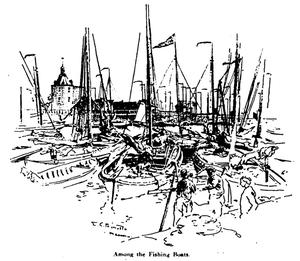
[pagina 608]
Tucked away in a little Dutch coun-
try town far from the railroad, there
stands a homely Koffiehuis, dipping
its feet in the slow-moving canal – a little
inn, where six of us, all Americans and all
art-students, went to spend the summer
some years ago.
Its doorway is tall and broad and well
fitted to frame the ample figure of our
vrow, with her good-humoured motherly
face shining in its aureole of snowy white
muslin. This door gives access to a nar-
row hall, immaculately clean, on one side,
of which is the large café, where the men
assemble to smoke their fat Dutch pipes
in the evening and on Sunday afternoons,
and where a fine keg of beer is always
on tap in its cool resting-place under the
counter.
Across the corridor is the living-room,
Also used as the dining-room, spacious
and high-ceilinged. One end of it is taken
up by a roomy, six-sided bow window,
whose tall sashes with their spotless cur-
tains give one an extented view of the
river as it lazily lags past. The wall by
the door hides a great cupboard where a
pitcher of milk, a generous pot of butter,
some Edam cheese, and bread ad libitum
are always placed ready to satisfy any
pang of hunger between meals.
When we came down to breakfast in
the morning we found, in front of the
fireplace over an oil-lamp, a great iron
kettle filled with oatmeal, to which we
helped ourselves with a wooden ladle.
Beside each place at table was a little
earthen jar filled with live coals and
covered with a grill, on which we made
our toast either of the flaky white bread
or better still of the solid graham loaf.
Disposed along the board, at equal inter-
[pagina 609]
vals, tea, coffee, or chocolate were kept
warm over little lamps of charming design
whose lights were shaded by dainty globes
of pearly white, decorated with repousse
images of four-clappered windmills and
canal-boats or Dutch peasants going to
market.
Dinner was served at one o'clock. Our
chief delight at that meal was the dressing
of the salad. Two great bowls of crip
lettuce and all the necessary ingredients
were placed upon a side table and we
took turns at mixing the dressing.
Each had a special recipe, but we all deferred
to one of us - a Southerner - who con-
cocted two things unapproachably well –
a salad dressing and wash drawings of
the irrepressible 'Pat'.
We never knew this little fellow's real
name. Though a ten-year-old Hollander,
from the date of his advent among us, his
long upper lip and merry little twinkling
eyes had warranted the Celtic epithet. A
cigar as long as his head was ever in his
mouth and, as he shuffled along, his hat
tilted back, and his hands thrust deep in
his wide little Dutch breeches, he looked
as he was the terror of the village. Though
his cigars and other luxuries were the
outgrowth of the Southerner's generosity,
'Pat' never missed an opportunity of
urging on his comrades to all sorts of
tricks tending to annoy the artist colony
and remained entirely oblivious to re-
monstrances.
At the hotel, besides our party, there was
a band of German students with their pro-
fessors from Carlsruhe. The two colonies
managed to get along very well in spite
of a wide divergence of opinion on the
subject of color. Above the dining-room,
in a sort of loft, which was used as a
studio, all our studies were tacked up to
dry. Here, side by side, hung representa-
tives of often the same subject painted
by pupils of two diametrically opposed
schools and results were usually edifying.
Two of our party had imbibed in Paris
the most pronounced ideas of impression-
ism and translated the deep rich gloom of
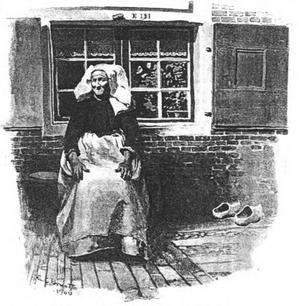
[pagina 610]
the Holland interiors into the pearly pinks
and greens of Monet, and these studies
strange enough in themselves, were con-
trasted with the deepest burnt umber and
bitumen of one of Germany's oldest and
most conservative academies.
When the hours of work were over and
the late twilight had closed in we gathered
in the dining-room for a bit of amusement.
We would have some music – or, one of the Ger-
mans, a most accomplished ‘cellist’, would
delight us with some of the deep soul-
stirring chords of his instrument. Other
evenings we would play games, even in-
venting them like children to suit the oc-
casion. Once the Germans gave a fête
and sent to Munich for a real keg of beer
which became but an empty barrel before
midnight. We got up charades and tab-
leaux vivants, and even rehearsed short
plays.
It got abroad that the men needed more
summer shirts – so the girls volunteered to
do the sewing if the men do the cut-
ting out. We delegated the Southerner (for
he had good taste) to go to Rotterdam
and buy the material. Then for a fort-
night followed a succession of most ex-
citing evenings. The great dining-table
was used as a cutting-board. One man
cut out the cuffs and collars, another the
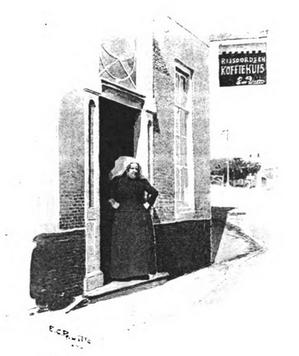
sleeves, another the bodies, while the girls
basted or sewed on the small hand ma-
chine.
How merry we were! And the good
vrow would stand by, with her little round
hands on her hips and drink in our merri-
ment.
She took us under her wing as her
children, and her word was not an idle
jest when she dubbed us her ‘family’,
for she nursed us when sick, cheered
us when downcast, and even loaned us
money when bankrupt.
She took a special pride in fattening
us up, and personally saw to it that we
ate enough. Regularly once a week we
[pagina 611]
[illustratie: The barber coming up the Kÿker]
were taken en masse to the barn-loft and
weighed - our weights being duly record-
ed on the wall. The scales consisted of
two platforms of wood attached to a big
rafter. The person to be weighed stood
on one platform while mijnheer piled
stone weights on the other and then did a
bit of mental arithmetic in adding the re-
sult. For most of us young people this
did not involve too much labor – mental
or physical - but when the vrow, or worse
still, when mijnheer himself climbed upon
the scales we worked hard piling on the
fifty-pounds! One of us had
the brilliant idea of putting rocks in his
pockets and thus surprised and delighted
our honest hostess by gaining twenty
pounds in one week, though to her dis-
gust he lost nineteen of it the week after,
and had to explain.
One night, toward the end of the sum-
mer, I missed the vrow, and going back
of the kitchen into her small domain, I
found her seated with her hands stretched
on the table before her, her eyes fixed on
a little brass lamp at the far of the
room.
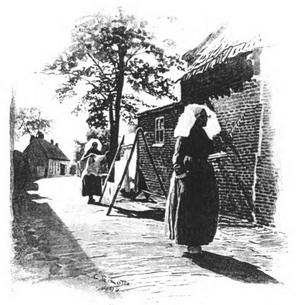
of the long winter that was coming, and
how she would miss us when we would
all be gone - but she would sit there and
think - think of her 'children', and the
thought would make her happy - for they
might come back again. Dear, whole-
souled vrow – to this day I have a warm
spot in my heart for you, you brave, good-
hearted little Hollander.
And Vrow Bloch - what memories her
very name brings up! Vrow Bloch was my most talkative mod-
el, though the old lady was seventy-five.
She lived at the end of the village in a
squatty little buff brick house, with but
one window and a door. The window,
with its heavy, bottle-green shutters, was
the salient feature of the cottage. Its
white curtains, edged with a border of
coarse lace, framed in the gay-colored
[pagina 612]
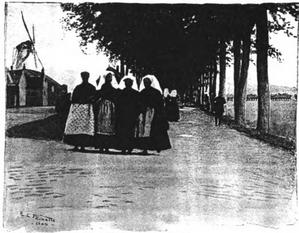
geraniums, turning their red flowers tow-
ard the passer-by.
Entering by a narrow-passage, lined with
copper cooking-utensils, a few household
provisions and a quantity of brooms and
scrubbing-brushes, a door to the left
brought you immediately into the single
sombre room. It was a low-ceilinged,
dark place, quite typical of all the pea-
sant house interiors. It was lighted solely
by the window, divided into tiny square
panes. By this window stood a straight,
high-backed wooden chair with arms –
Vrow Bloch’s habitual seat - and near it
an oilcloth-covered table on which I in-
variably saw a ball of black knitting-wool
when the needles were not busily clicking
between the good vrow's fingers.
Near the window also stood the dresser
containing the necessaries for her meagre
meals. Upon one end of its shelf rested
a lacquered tray, so polished that window,
flowers, and a peep of gray sky were al-
ways reflected in its shining black surface
- a bit of minute detail such as Van Eyck
loved to paint. In the centre of the same
shelf stood a little violet-colored pitcher
circled with stripes of burnished gold -
her greatest treasure this, carefully guarded
since the first days of her married life.
The decoration of the shelf was completed
by a tin box containing the much-appre-
ciated honey cake.
Opposite the dresser stood the wide-
mouthed chimney-piece. In its sombre
recess, on a blue-tiled porcelain oil-lamp,
the potatoes were boiled and the water for
the coffee was heated. These two ali-
ments constitute the chief nourishment of
the Dutch peasant. A row of brass can-
dlesticks were lined up on the mantel-shelf
[illustratie dog-cart]
[pagina 613]
and at one end the coffee-grinder was
placed. An old clock, with long chains
and weights, hung in a corner, and its
grinding tick-tack broke the monotonous
silence, otherwise only disturbed by the low
cooing of the fat, well-fed dove. It hung near by in the dove-cage, which is
found in every humble home in Holland
- a cage no larger than that of a canary
and in which the gray bird passes its days
of dismal captivity. The feature of the
room, however, was the bed in the wall,
and the innumerable cubby-holes which
surround it. These dark bunks, shut in
by their checked green and red cur-
tains, were always unhealthily mysterious
places to me, for the unlimited space be-
sides containing the bed, seemed the re-
ceptable for all the owner's possessions
- stowed away on shelves which reached
to the ceiling. The room itself never be-
[illustratie The orphanage at Enkhingen]
betrayed the slightest suggestion of a sleep-
ing apartment - no article of wearing ap-
parel, no article of toilet was ever visible.
Vrow Bloch was contructed on some-
what the same plan as a Lombardy pop-
lar - tall and straight, her bony arms
swaying, and her old head nodding as the
breeze caught her plain coif. I say plain
coif in distinction to the elaborate lace
ones which are worn in Rysoord. Very
old women, and women in mourning, al-
ways wear a simple wide-hemmed mousse
with no lace trimming.
One day I chanced to speak to her of
the uncomely fashion the Dutch women
have of wearing démodée hats and bon-
nets on top of their beautiful caps, making
both head-dresses ridiculous by their utter
incongruity.
I noticed the old lady became fidgetty
in her pose. She finally got up and
pulled aside the checked curtains which
hid her bed and standing on the little
step, plunged into its obscure recesses.
For a moment her old body was hidden, but
soon she reappeared with two great boxes
in her arms. Her good old face was flushed with excitement.
Putting the boxes on the floor she drew
up her favorite chair and her long bony
fingers - fingers that had never ceased to
labor in honest toil – trembled as she un-
tied the fastenings. Then, one by one, she
showed me the coifs she had worn for sixty
years all freshly laundered, though some were discolored
by age. There were tiny round crocheted
caps, such as women wear in the flax fields;
there were elaborate lace ones, and such a collection of oldfashioned black bon-
nets! She explained that the bonnets were adopted by old
ladies a decade or so ago, and now,
even the young girls wear hats over
their coifs because they think them be-
coming.
After much admiration on my part, and
considerable retrospection on hers, the
boxes were tied up and laid away in the
dark closets by the bed, and the checked
curtains again pulled to.
Vrow Bloch resumed her seat by the
window, and her old hands took up the
knitting - those knotted bony hands, her
life of work was written on each swollen
twisted knuckle. Her fingers, however,
again dropped the needls and lay idle in
her lap, and her gaze was far away, and
her old yes grew dim, and I fancied
that her thoughts had drifted back to the
[pagina 614]
day when she donned her wedding coif,
still treasured in its sanctum by the bed.
Some days, the only interruption of our
posing hours, was the grinding and mak-
ing of the coffee, at eleven o'clock. I
always took a cup with my old friend, and
it was a very serious affair. If I chanced
to be working in the afternoon, the only
distraction would be when the the vrow sol-
emnly left her seat and, going to the
checked curtains, brought forth a large-
mouthed glass jar, which contained some
dozen crisp, clear, yellow and red candles.
She would hand me one in her bony fin-
gers, take one herself close the bottle,
and restore it to its shelf.
Her Bible always lay on the table. Once
I got her to pose, reading it, but soon her
head bent low, and she was asleep. She
said that, winter and summer, she was up
at four, and read her Bible till daybreak,
though I've often had my doubts about
the reading, and am rather inclined to
suspect that the good old soul finished her
night's rest with her fingers between the
Bible leaves.
Each of us had our special favorite
among the models, though for varity, we
would exchange with each other. There
was Drika, the Van Ness's daughter, who
posed par complaisance, and not because
she needed the money; and the cobbler's
wife, with a head poised on its slender
snowy neck, like a Memling Madonna;
and little Mimi with her straight flaxen
hair, and the poor people down in the Ky-
ker, who pose at any price.
But it was generally understood that
our models would not pose on Saturday
that day being exclusively devoted to
house cleaning within and without. Early
in the morning every stick of furniture is
carefully rubbed and wiped and taken
out of the house. Then the women, with
their skirts tucked up, entirely flood the
rooms with bucket after bucket of water,
brought up from the canal by means of
the shoulder-yoke. With broom and brush
they souse and scrub the red-tiled floor
and finally pull up a plug in one corner to
let the water flow out - let us hope into
the canal.
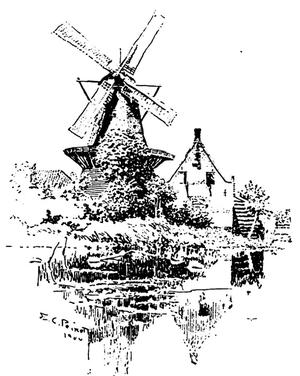
[pagina 615]
[illustratie: A Country Vender and His Cart]
While the floor is drying, a great pol-
isshing goes on in the street. Quaint old
brass lamps and candle-sticks, tobacco-
boxes and ash-trays, huge milk-cans-all
are burnished until, like golden mirrors,
they reflect the red-cheeked, white-capped
faces bent over them.
The lacquer-man in busy on Saturday.
He goes from house to house painting
the the bread-trays and honey-boxes
with designs of gaudy birds and wondrous
leaves and flowers.
The street is in a turmoil until noon,
when order is partially restored and the
scanty midday meal partaken of. In the
afternoon washing is resumed. The ex-
teriors of the cottages are scrubbed from
door to pavement and every trace of
would removed, for in this low, wet air the
green moss gathers quickly. Then the
brick pavements are drenched and care-
fully dried, and I had even seen the
women slip off their sabots and tiptoe to
their doorway in their woollen chaussons,
so as not to soil the immaculate sidewalk.
Lastly, toward evening, the entire vil-
lage goes to the canal, and all the sabots
are washed and whitened with pumice
stone, spotless for the morrow. On Sat-
urday evening all the pickets of the low
black fences are decorated with rows of
dripping foot-gear, carefully graduated
in size from the big wooden shoes of the
father down to the tiny sabot of the
youngest born.
The Sabbath-day in Rysoord is marked
by an impressive peace. The women, as
the men, seem sincere in their devotions.
Though the village is divided into two
congregations there is a little conflict of
opinion.
On Sunday morning every Hollander,
young and old, dons his best apparel.
His clothing is marked by the greatest
sobriety. The old women dress in black
with a quantity of very full skirts. On
their heads and over their shoulders fall
the snowy coif surmounted with the time-
honered bonnet tied under the chin with
wide ribbons. They carry their Bible
clasped in both hands before them as
they dignifiedly clatter along in their fresh
sabots.
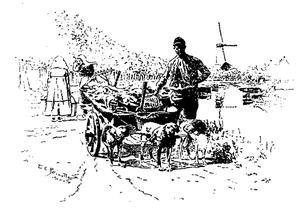
in colored skirts or sombre green, deep
red, or heavy brown, with aprons of va-
rious patterns. Their mousse is fastened
to the hair with gold or jewelled pins;
[pagina 616]
[illustratie: Stadhuis in Hoorn]
golden spirals adorn their temples, while
ear-rings of filigree hang in long pendants
almost to the neck, and quaint chains bind
the throat.
Mynheer is invariably clothed in black.
A high black stock and a funny round
cap pulled over his eyes give him an an-
cient air which is further heightened by a
bushy beard brushing out from under his
square well-shaven jaw. His upper lip
seems ever closed over a long cigar. I
never remember a Dutchman's hands, for
they are ever thrust deep in his ample
breeches pockets.
With what pleasure do I recall the tran-
quil Sunday evenings in Rysoord!
Afternoon servive over, the people come
out on the avenue - that interminable
straight walk where the trees interlace their
far-stretching branches in a high green
vault, broken here and there by a few rays
of the late sun - a strange light, making
of a sudden the intertwined branches
and tender leaves flash out like glorious
stained-glass windows, and the long
avenue, with its giant columns, an endless
Gothic nave.
In its deep shadows, coming and go-
ing wonder the young and olderly moth-
ers, youths and their sweethearts girls and
boys. Young girls walk four and are to-
gether linked arm in arm. They have put
aside their unseemly hats and the fall folds
of their lacy coifs frame their bright round
faces. Their flirtations are quite affairs.
They are quite content to have their swains
walk behind them, puffing at their long
cigars. A rare ripple of laughter, or a
shout from a lusty lad, vary the continual
chatter of big and little wooden shoes.
As night creeps on and shuts out the
last light of day, the peasants enter their
low, tiled houses to partake of the evening
meal. Quiet lights, like tiny glow-worms,
glint along the avenue, and as we wander
down its dark, deserted way, a sense of
utter peace and quiet rests within its shady
aisle.
Scribner’s Magazine (mei 1901; pagina 608-616) door Mary A. Peixotto